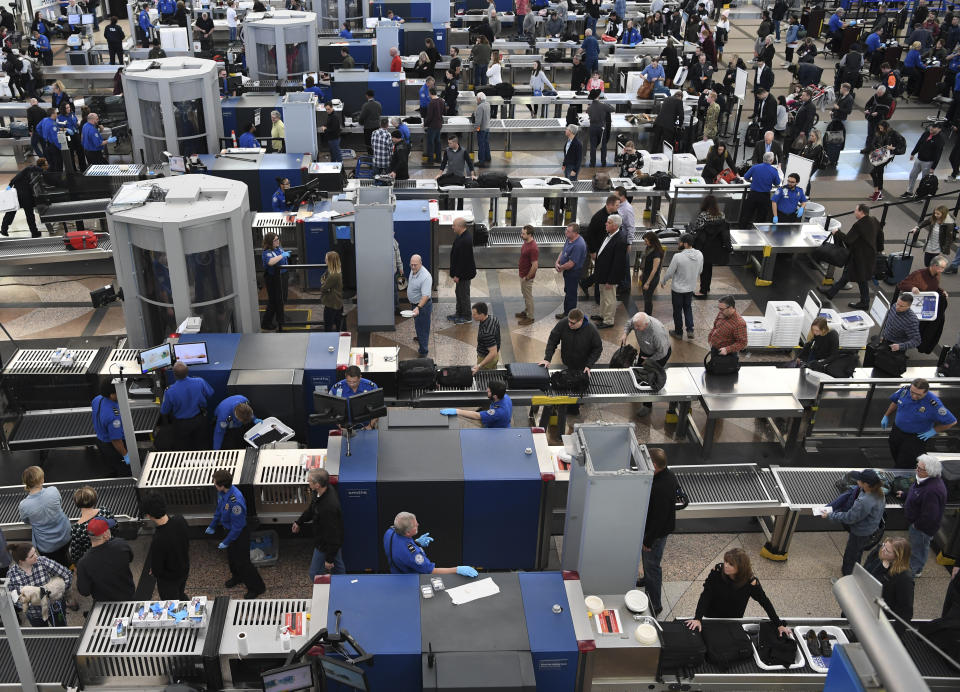'Blue flu': More and more TSA agents stay home amid ongoing shutdown
This post has been updated.
A “blue flu” continues to sweep across the nation’s airports as more Transport Security Agency (TSA) employees call in sick after yet another no-pay day amid the government shutdown.
On Thursday, Jan. 24, TSA reported a 7.6% rate of unscheduled absences, compared to a 3% rate on the same day in 2017. According to the press release, “many employees are reporting that they are not able to report to work due to financial limitations.”
This is a slight decrease from earlier in the week, when 10% of TSA employees called out sick from work on Jan. 20. Nevertheless, the absences over the last two weeks have been about twice the normal rate.
In an effort to curtail some of the absences, TSA announced that airport screeners and other agency employees will begin to receive partial back pay. It will amount to slightly less than half a paycheck. The pay will cover Dec. 23 through Jan. 25, and “the agency is able to do this by pulling the money from remaining fiscal 2018 appropriations,” POLITICO reported.
CBS Correspondent Kris Van Cleave, citing TSA Administrator David Pekoske, reported last week that TSA employees were starting to stay home because of the shutdown: “It’s not a sick out, officers aren’t pretending to be sick. They are saying they cannot afford to work for free any longer.”

TSA previously told Yahoo Finance that “the number of [Transportation Security Officers] that work on any given day is approximately 33,000.” So thousands of TSA officers are now missing work each day.
The wait times at airport security checkpoints were considered longer than normal for several airports on Jan. 24. Hartsfield-Jackson Airport in Atlanta reached a maximum wait time of 42 minutes, with BWI Airport not far behind at 37 minutes. Other extensive wait times included Houston, Honolulu, Minneapolis-St. Paul, and Miami.
TSA agents skip work amid historic shutdown
The current shutdown is the longest-ever in history, and politicians are still engaged in a deadlock as they fight over President Donald Trump’s proposed $5.7 billion steel border wall on the U.S.-Mexico border.
Various government agencies have put federal workers on either furlough or are making them work without pay as the shutdown drags on.
Over 50,000 TSA employees are still expected to work since they are considered “essential.” Screeners represent 6% of those who didn’t get paid.

“Not only will continuing the shutdown increase airport delays and hinder commerce,” Committee on Homeland Security Chairman Bennie G. Thompson said in a statement., “it could have a negative impact on aviation security if a resolution does not come quickly.”
While the TSA maintains that security check standards are still upheld, “The reality of that is completely different,” Metropolitan State University Denver Dept. of Aviation and Aerospace’s Jeffrey C. Price, who trains airport management staff and has previously worked with TSA agents, told Yahoo Finance.
“You’re doing a job that requires tremendous amount of detail and focus. You’re not going to be focused when you’re constantly worried about [bills]. It’s just human nature.”
‘Do I pay for the child care? … or do I buy food?’
While some — such as White House chief economic advisor Kevin Hassett — argue that affected federal workers are “better off” with the shutdown because they will eventually get backpay after the government reopens and they “don’t have to use their vacation,” many disagree.
“I’m on a lot of medications, because I’m a year out from being a breast cancer survivor, so I have to make the decision,” Angela Tucker, a corrections officer at a federal prison, recently told the New York Times.
“Do I refill all of my medications even before I need them, because I might not have the money later, or do I pay for the child care? … or do I buy food?”

‘We are getting into a busy booking period’
“The good news is that this is a quiet travel season,” Seth Kaplan, editor of Airline Weekly told Yahoo Finance. “As bad as the lines are right now, they would be even worse if this were, say, a holiday travel period.”
Kaplan added that, on the other hand, “We are getting into a busy booking period for spring and summer travel. The images of what’s going on at airports surely aren’t enticing people to travel … If it drags on, some people could make other plans – say, road trips instead of airline trips – and airlines and airports could lose some would-be passengers.”
— Yahoo Finance’s Krystal Hu and Adriana Belmonte contributed to this story.
Aarthi is a writer for Yahoo Finance. Follow her on Twitter @aarthiswami.
Read more:
Lawyer for federal workers explains why they’re suing over the shutdown
Federal employees are increasingly concerned about a long shutdown
The government shutdown is hitting these U.S. states the hardest
Follow Yahoo Finance on Twitter, Facebook, Instagram, Flipboard, LinkedIn, YouTube, and reddit.



